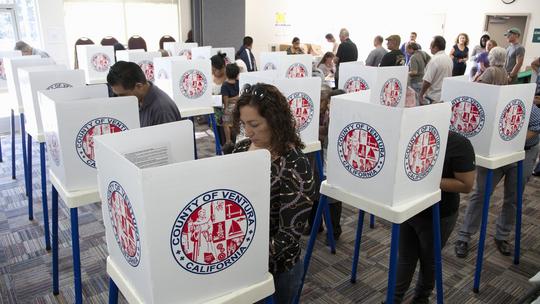
Despite being the first state to switch to fully electronic voting in 2002, Georgia has since reverted back to paper ballots.
After experiencing a hacking scare and a lawsuit concerning the lack of overall security with Georgia's previous voting machines, the Secretary of State has released new voting equipment that combines paper ballots and digital screening and scanning.
Voters will make their selections on a digital screen and print out a paper ballot, which voters will check for accuracy. If the paper ballot correctly reflects their choices, voters will submit the paper ballot to be scanned through a machine, counting their vote.
The decision to move back to paper ballots came after a federal judge handed down a decision to switch back to physically ballots in 2020. In August, U.S. District Judge Amy Totenberg ruled the previous all-electronic voting machines were “unsecure, unreliable and grossly outdated,” but said it would be too disruptive to switch to paper ballots before the elections in fall 2019. Totenberg barred the state from using the electronic voting machines after 2019.
The new system cost the state $104 million to replace old electronic voting stations. Early voting in Georgia starts March 3, and the primary election is March 24.
However, activists are now concerned the new voting machines raise a different kind of concern for privacy. Unlike the previous voting machines, which had the potential for hacking, the screens on the new voting machines might be large and bright enough for other voters to see a voter's selection --- which is a violation of ballot secrecy provisions in state law, according to Fox 5.
A petition was filed in Sumter County Superior Court against the five members of the county election board. Activists have asked the court to conduct an emergency hearing and rule for digital-free paper ballots instead of touch screens.
In December, Richard DeMillo, a professor of computing at the Georgia Institute of Technology, told the Washington Post he was concerned about privacy after visiting polling places in a county north of Atlanta during a recent local election.
DeMillo told the Post voters waiting in line could see the screens from 30 feet away and who voters were casting their ballot for, presenting serious privacy concerns. During the local elections, some counties reported that programming problems led to delays in checking in voters, and in some voting districts, the machines unexpectedly shut down and rebooted.
Voter privacy and hacking have become a growing concern for citizens across the nation, but Georgia is no stranger to hacking: in 2017, nearly 7.5 million voters' information was exposed after a security researcher “probed” the system. In 2018, University of Michigan professor Alex Halderman changed votes in a hypothetical election before an audience in a demo at Georgia Tech, using the same digital touch-screen machines used in previous elections. In the days leading up to the gubernatorial election in Georgia, now-Governor Brian Kemp alleged the voter registration database was hacked and launched an investigation into the Georgia Democratic Party. However, the lawyer who said he alerted Kemp’s office and the FBI to the possible vulnerability in the voting registration database told Atlanta Inno that there was no evidence of a hack, nor that said hack involved the Democratic Party.








